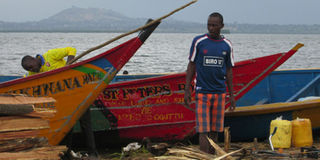Namayingo’s deadly walk to quench thirst

Fishermen at at Busiro Landing Site. Photo by Ronald Seebe
Ms Eunice Namusubo looks at the grave of her 15-year- old daughter in Lolwe village, Namayingo District in disbelief. It was November 20, 2015 when she sent the late Claire Naisikwe, then a Primary Seven pupil at Lolwe Primary School to fetch water at about 5pm.
As she kept home waiting for a jerrycan of water, Namusubo instead received the horrible news. “Claire’s friends came running and informed us that a crocodile had grabbed her into the water” Ms Namusubo said with vivid memories of her first born.
Yet even when Ms Namusubo still moans for the loss, she is consoled by the fact that Naisikwe is not the first to be devoured by crocodiles in Lake Victoria. Many other people in her village and neighbouring islands have been killed or survived with deep injuries because of crocodiles attacks.
“They (crocodiles) are very many and dangerous here. You cannot tell whether the children or your husband will come back from the lake,” Ms Namusubo, whose husband is a fisherman said.
With such unfortunate incidents, one may imagine the residents would stop going to the lake to save their lives, but that is not about to happen.
“The lake is where we get water and our husband fish to get money to support us. If we leave the lake, what are we going to eat?” she asks.
Lolwe Island has no boreholes and Ms Namusubo says she keeps sending her children to fetch water despite the real dangers, “because the lake, is the only source of water”
Mr Wanyama Musumba a fisherman at Busiro landing site said, they have lost many colleagues to crocodiles attacks in the past two years.
"Fishing now days has become risky compared to the past years where crocodiles were few in the lake" Ms Musumba said. Under the current wildlife law, locals are not allowed to kill crocodiles.
They are, instead supposed to identify the dangerous animals and inform the Uganda Wild life Authority who decides on relocation or not.
Mr Lazarus Mugeni, the chairperson fishermen in Namayingo District said the government is not doing enough to protect fishermen and other lake users.
“For how long are we going to die? Our children who have come to fetch water are attacked just like the fishermen. We want government to kill these crocodiles,” Mr Mugeni said.
“Other villages have boreholes but we do not have any. Aren’t we voters,” he wonders.
Other dangerous islands infested with crocodiles include; Rabolo Zone, Mwango, Kisum, Golofa, Kandenge, Muwagod,Butanira, Singira, and Kamwenge all on Lake Victoria.
Others are Labachi zone, Sigulu, Biisa, Mukeli, Motolo and Lubango landing sites.
Mr Joshua Nandago, the secretary fishermen committee in the district said, last year they registered at least 32 people who were killed by crocodiles and 54 others survived but with horrible injuries.
"The number is likely to increase because of increased number of crocodiles in water. It is like they are producing every day,” Mr Nandago said.
This year, he said, 15 people have been killed by crocodiles while in water or walking on the shores of the lake. He says five people died at Sigulu, six at Labachi Island while four were killed by crocodiles at Motolo.
Although government and partners like civil society organisations have supported Ugandans to increase safe water access to an average of over 70 per cent across the country, more work is needed especially in hard to reach areas.
Prof Ephraim Kamuntu, the Tourism, Wildlife and Antiquities minister said the immediate action now is to relocate the crocodiles before addressing another reasons why the animals are attacking people.
So far, he said, 124 crocodiles have been captured and relocated in the past one month.
“We have realised these animals cannot co-exist with humans. We are going to relocate them to Murchison Falls National Park,” Prof Kamuntu said.
On the other hand, Mr Ronald Kibuule, the State minister for Water in a separate interview said government intends is to establish boreholes in affected areas to reduce the number of people who go to the lake to fetch water, which is sometimes contaminated.
Lake Victoria, because of the many industries around it, is increasingly becoming a dumping site for industrial waste although the lake is a source of livelihood and water to millions of East Africans.
Safe water, which can prevent diseases like cholera, typhoid among others, is important to a country like Uganda struggling to fund her budget. Poor sanitation means using the limited resources to take care treat sick citizens, a venture which is normally expensive.
A desk study done in 2012 by the Water and Sanitation Programme (WSP) of the World Bank estimated that Uganda loses $177 million (Shs636.3billionn) annually due to poor sanitation alone.
As Namusubo keeps moaning her dear daughter, she hopes that one day, the promise under National Development Plan II (NDP II), of increasing water supply coverage in the rural areas from 65 per cent in 2012/13 to 79 per cent by 2019/20 is realised and that her village will be a beneficiary.




